The Long Road to London Bronze: Interview with Canada’s Christine Girard
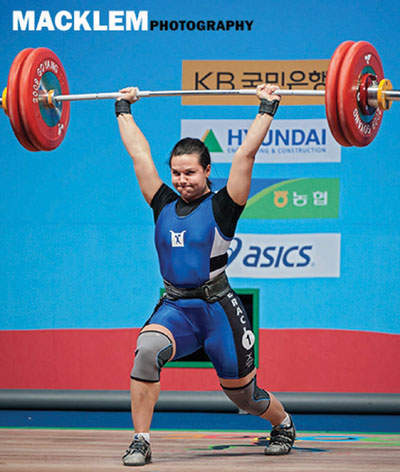
The London Olympics was a special time for everybody in the weightlifting community. We all watched for days as world records were smashed, new champions were crowned, and old champions defended their titles with extraordinary performances. As usual, most of the medals were collected by athletes from Eastern countries. China, Russia, Kazakhstan, North Korea, and various former Soviet republic nations swept up the majority of the hardware…nothing new there. However, those of us here in the Western half of the planet got a special treat when the women’s 63-kilo class took the platform.
Christine Girard became the first Canadian woman in history to win an Olympic medal in weightlifting when she totaled 236 kilos and walked away with bronze hanging around her neck. Finishing ahead of athletes from traditional weightlifting powerhouses Turkey and Bulgaria, 27-year-old Christine made her lifelong Olympic dream come true in London. A weightlifter from North America winning an Olympic medal is, unfortunately, an extremely rare occurrence. I think I can speak for a lot of people when I say it was a big morale boost to watch this little lady go head-to-head with the titans from across the Atlantic and come home successful.
She was generous enough to agree when I asked her for an interview a few weeks ago. I knew our Performance Menu readers would love to hear about her path to the top, and she didn’t disappoint me with her answers to my questions. So, here is an interview with 2012 Olympic Bronze Medalist Christine Girard from Canada.
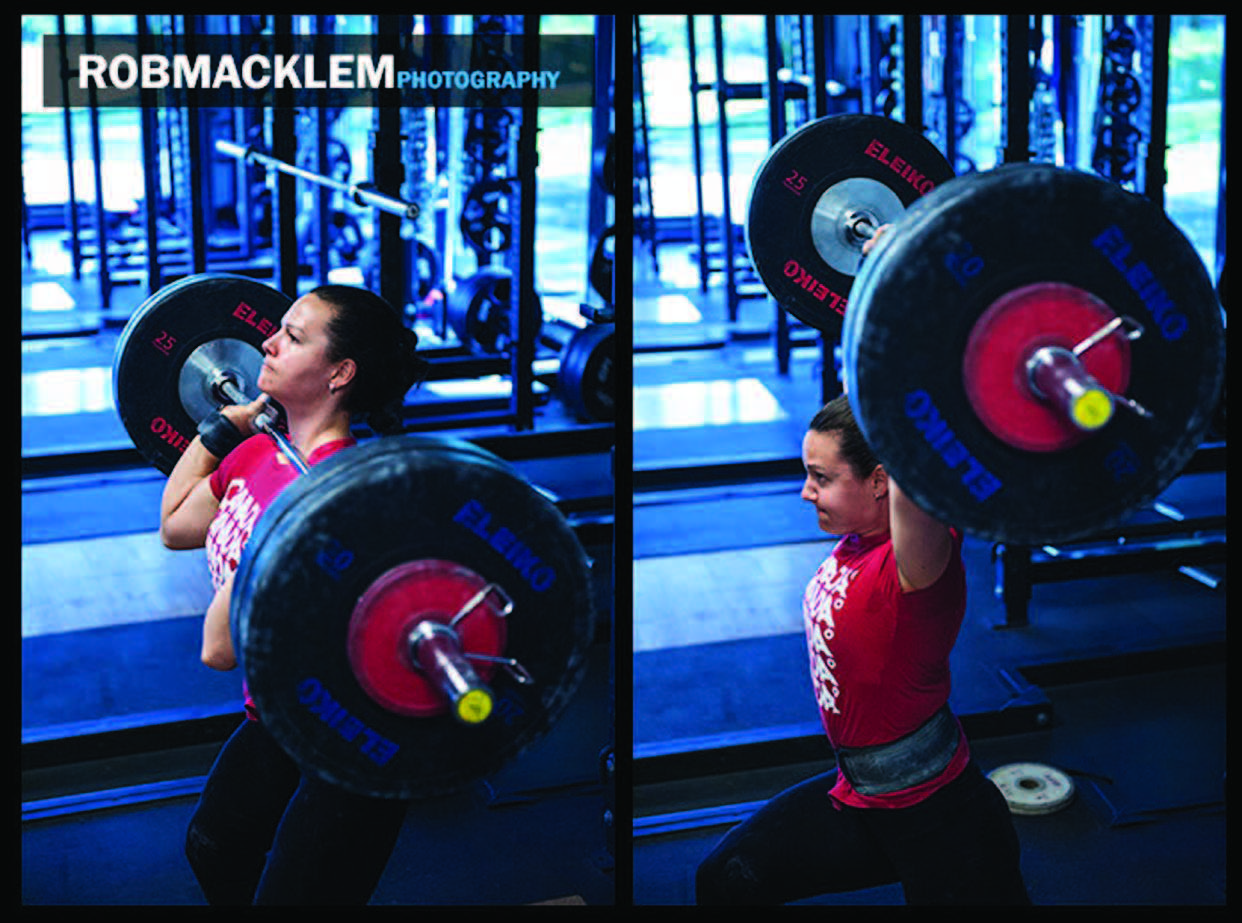
Tell us about your background. Where are you from, where do you currently live, what’s your occupation (if you work in addition to training), family life, what kind of sports background do you have outside of lifting, etc.
I was born in Elliot Lake, Ontario. When I was young and living there, my older sister met a weightlifter that was on the junior national team and for some reason, she became her hero. Caroline, my sister, wanted to start weightlifting, but the coaches in Elliot Lake thought she was still too young to start, so she had to wait.
My dad was working in a mine, and then the mine shut down. It was a bit on hard my family, but my parents never showed any sign of it. We quickly moved to Rouyn-Noranda (Québec), close to my extended family and close to my parents’ home town (Ville-Marie) and my dad went back to school. My parents wanted us to start a sport so we could make new friends and integrate into our new town better. Caroline really wanted to start weightlifting, and even if my dad tried to make her change her mind, it never worked! My parents knew that weightlifting wasn’t the best sport for a 12-year-old girl to make new friends. Anyways, that is how weightlifting entered into our family life. My sister started and I followed (I was only 10). A bit later, I also played some volleyball, and I was able to make some friends, but after 3 years of doing both sports, I kind of had to choose because my schedule was too tight…so I continued in weightlifting.
I did all my schooling in Rouyn-Noranda, and I was doing my degree to be a high school math teacher when I competed in the 2008 Olympics. I finished that degree in May 2009, and in the following months, I moved in White Rock, BC to follow my boyfriend, a weightlifter that I met on the national junior team in Korea in 2005. He is a RCMP officer (police/mountie) and got a job in the West. For him it was a good thing: he was going back home after a few years of living in Québec. For me, the move was a bit harder: I had to leave my family, my friends, and my supporters to live in another province, with another language and much less support for athletes. But it was worth it because we got married in 2011 and we are really happy together, with our little dog Chibi to complete our small family!
From 2010 to the Olympics, I decided not to work as a teacher. That job is really hard and time-demanding and I really wanted to get on a podium in London, so I put all my energy into training. I also became a coach for a few high level athletes in BC, on top of coaching myself. I had five different coaches in the past four years in my life….I tried, but in the end, the best for me was to make my own training program: that is how I was able to better control my injuries and also make more progress. My husband became my number one supporter: he was my training coach, my home physio, massage therapist…my everything! I also got the help of Jeane Lassen (2008 Olympian) in the last few months before London, and she made a big difference in my preparation. She is a weightlifter too, and we were training together until she injured her back in April. She could have stopped working with me at that time, but she did the opposite and started to help me even more! I was lucky to have both of them on my coaching team. Also, as I needed someone with international coaching experience for London, Guy Marineau became my competition coach in December 2011 and he was with me in London.
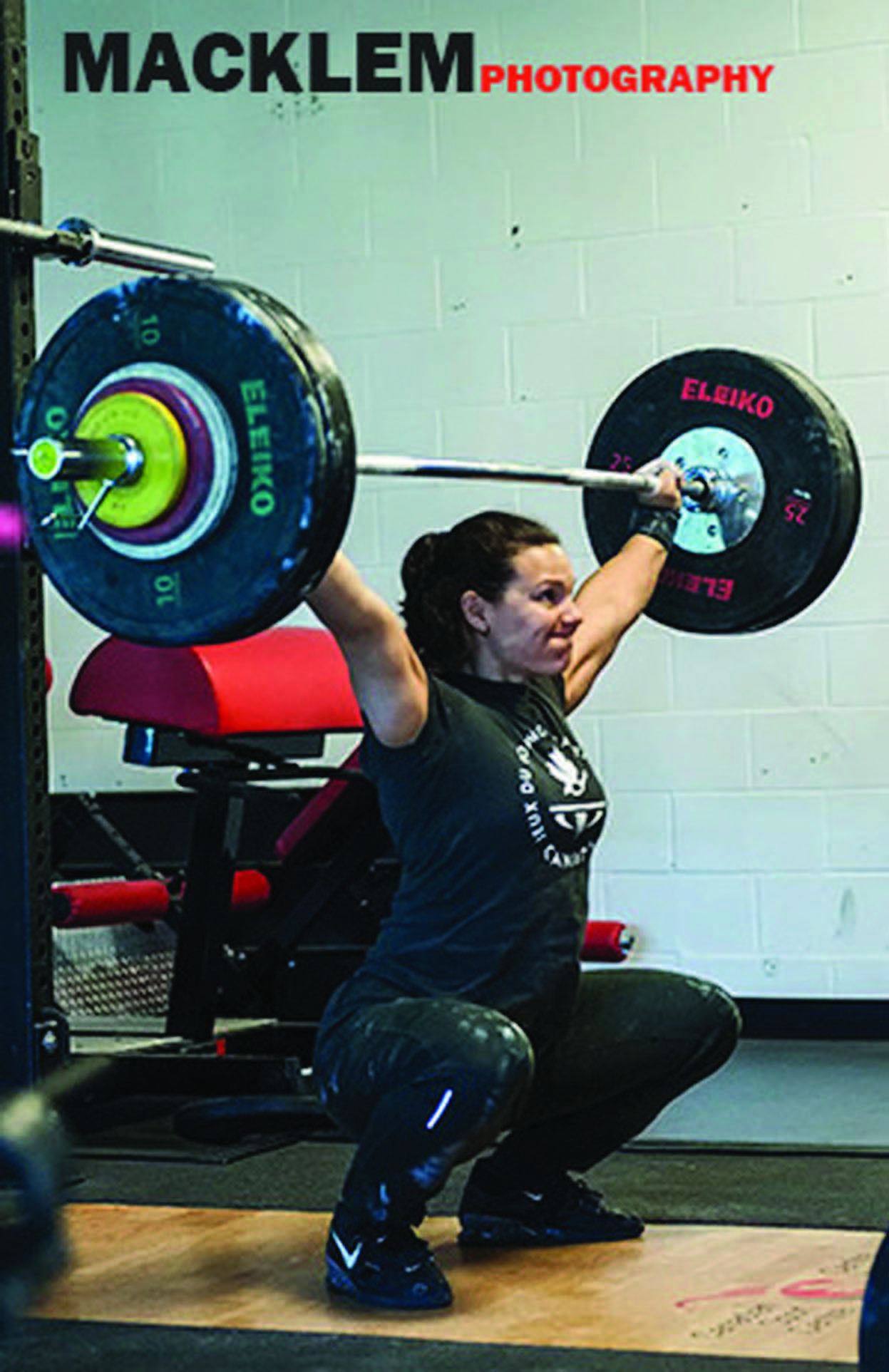
Describe your weightlifting history. When/how did you start? Who have your coaches been? What championships and international teams do you have on your record? What are your best lifts?
My best training lifts are 108 snatch and 135 C&J. My best lift as a 69 (I weighed just under 67) was 107 and 136, and I did them one month before the Olympics. My best 63 lifts are 106 and 133, but my best total is 238kg.
My first competition I did was a local one when I was 10. At that time, my body weight was 38kg I think, and I did a 22.5kg total. I succeeded with 7.5kg on my first attempt and 10kg on my second attempt; they made me do 10kg again on my third attempt so I wasn’t lifting too heavy for my age and size! I did 7kg-10kg-12.5kg for my three C&Js…as you can see, I’ve improved quite a bit in the past 17 years! Crazy what practicing and training can do!
Through all the years, I had a lot of different coaches. So many that I kind of stopped counting. The good thing is I always learned things with every one of them. Sometimes through really good examples, sometime through really bad examples! Both times, I learned quite a bit! In the past few years, I’ve been in control of my programming and preparation, and that was the best for me. I was able to do that because of everything I learned in the past years though, and I don’t suggest other athletes do that. Training and competing is hard enough, when you have the chance to have a good coach making decisions for you, it is really worth following! As for a list of all the competition I did, please look on my website: www.christinegirard.ca/EN/RESULTATS.
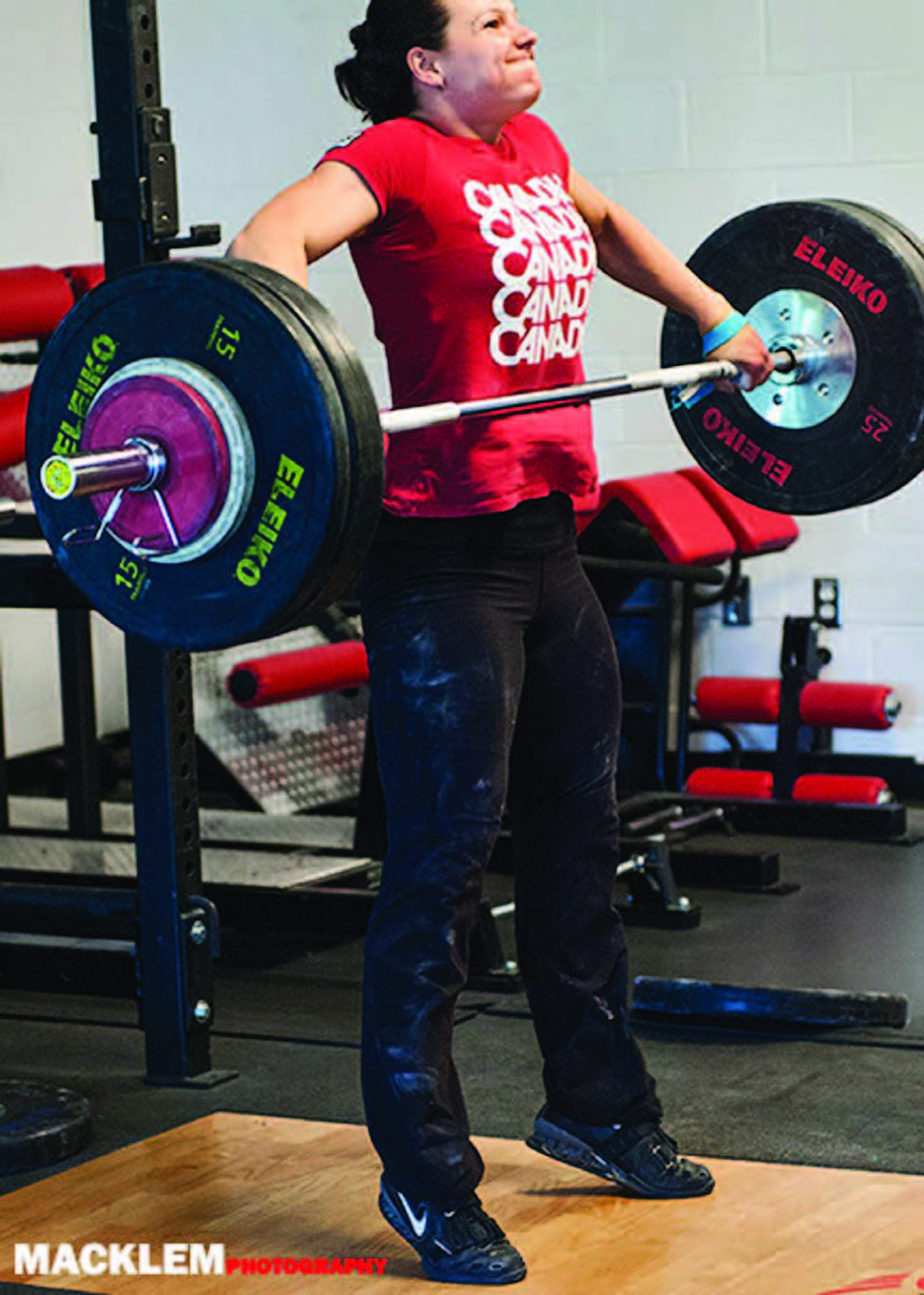
Describe the London experience. What was the Olympics like, what do you remember most about the competition, etc.? How did it feel when you knew you had that medal nailed down?
London was a really challenging experience for me. I was feeling ready for it in the few weeks before, my weight loss was going well, and one week before my competition, I injured my shoulder in training! I had pain doing most of the normal lifts: I couldn’t clean, couldn’t jerk, couldn’t snatch. Even doing pulls was putting stress on my shoulder and I had to cut it out of my training for a while. Mentally, it was really challenging. I spent most of my time at the medical center at the Olympic village and had a lot of therapy on my shoulder to make it good enough so I could keep my lift over my head the day of my competition. I injured my stabilization muscles, and the day of my competition, it was really hard to stabilize the weight overhead….I had never before been so shaky at the end of my lift! On my last snatch at 105, I missed it and I hurt my shoulder just a bit more. I knew I was ranked 4th after the snatches, and I knew I would need a really good clean and jerk for me to catch up. The only thing I was able to think about was my technique, as I knew I needed my technique to be as perfect as possible so I could actually hold my lifts stable…and I was just hoping with all my heart that my shoulder would hold it long enough. I didn’t care about the pain; I knew it would eventually go away….but I really wanted to give my everything.
So I did the best with what I had that day: an injured shoulder. When I missed my last jerk at 135, I thought I was finishing 4th again, like in Bejing. I was so sad for a few seconds, but at the same time, I really felt like I gave my everything and I had nothing left in me: everything went there, on the platform. I sent my kisses to my family, and went back to meet my coaches…I looked at my husband, and he was smiling at me. I was so confused! Why is he smiling? I missed it! Then, always with his big smile, he showed me three fingers, telling me I did it, I finish 3rd. I couldn’t believe it a first. Then I looked at my other coach, and he said the same thing! After that, I can’t really remember what I did or said other that “We did it”! I was so happy! We, Walter, Jeane, my family, my friends, my supporters, everyone who believed in me…it was a success for all of us!
Being on the podium and seeing the Canadian flag rising for me, for all my team, was the best feeling ever in my life! I was so proud! 17 years of training, of injuries, of changing coaches, of obstacles, of training in my garage was so worth it for that special moment!
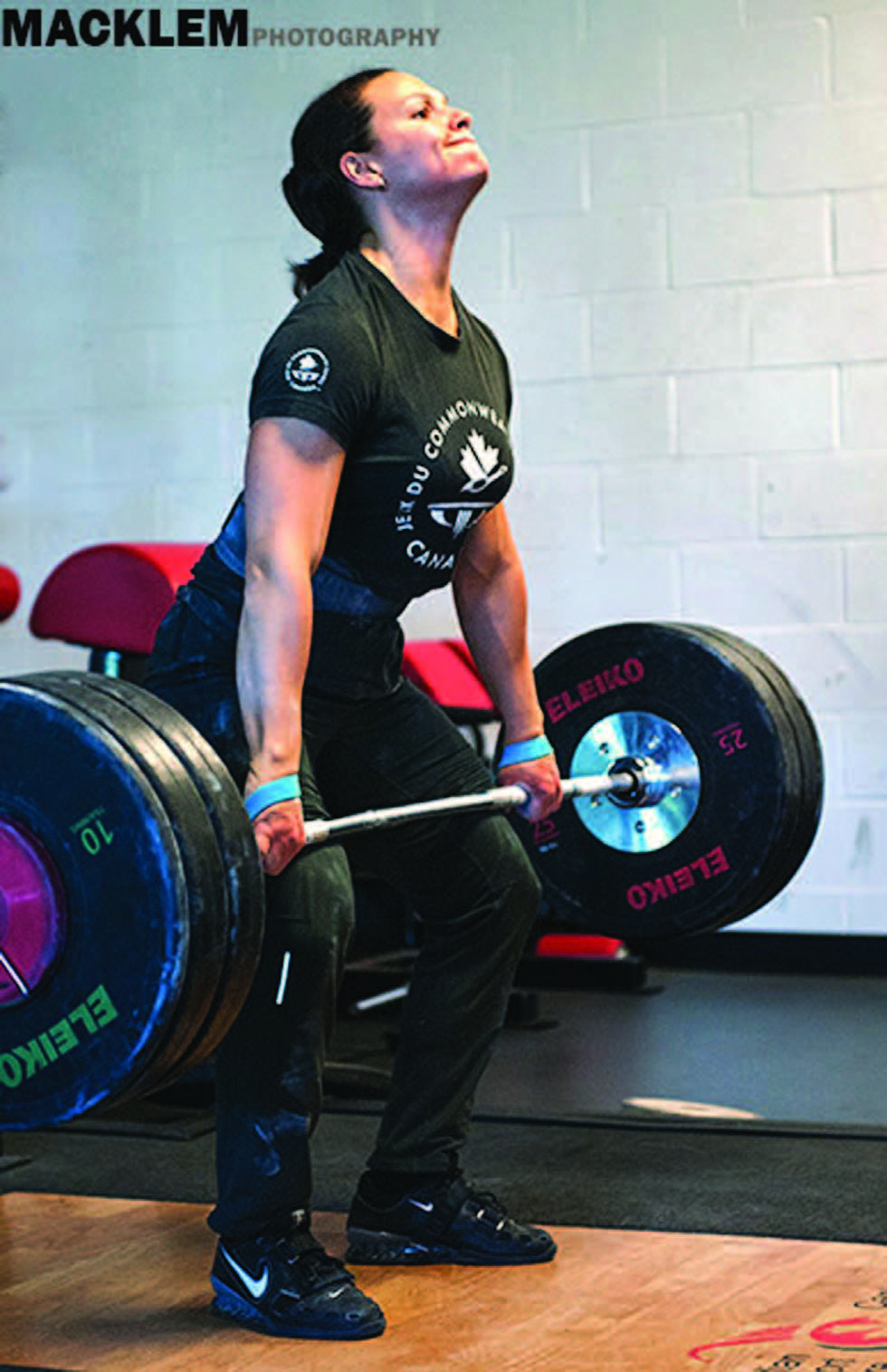
Please give a basic description of your training. Just tell us as much as you can about your program, weekly/yearly planning, etc.
For the past few years, I trained 8 times a week almost every week. I did 2 double trainings 3 times a week so I can give myself 2 days off per week. One of those days off was reserved for my massage and my physio when I needed it. The other days off were a real day off the gym. I was usually having a walk or a bike ride with my dog for some active recovery.
Also, I was spending quite a bit of time for my recovery: stretching, hot tub, ice bath were in my schedule every week! I also had some visualization included in my schedule, so I could control every sphere of training. Obviously, my nutrition was also well looked after…once again I did that part mostly by myself after reading a few books and chatting with a few nutritionists.
As for the actual training program, I had a lot of variation in it: a lot of different exercises and I changed it every single week. I never did the same week twice in the past few years.
Tell us about the support situation for Canadian weightlifters. Do you receive any financial assistance from your sports federation, government, or sponsors?
In Canada, our best weightlifters receive money from Canada government as a salary to be an athlete. They give us $18,000 a year, which is really not that much, but it still helps. The Québec provincial government adds money on top of that for their athletes, and also offer services for free such as massage, physio, nutritionists and sports psychologist. So when I left Quebec to live in the West, I lost almost half of my “salary!”
That being said, I was lucky enough to be on a special program called “Own The Podium.” It is a special program that offers some funding to athletes and teams that have a chance to have a medal at the Olympics so they can afford to go on training camps, have services like massage and things like that. Own The Podium never actually gave me money, but paid for my travel, training camps, recovery etc. This program allowed me to have what I needed for my training in the past few years.
What are your plans and goals for your weightlifting career? How do you see your future in the sport? Do you plan to stay involved in weightlifting after your top competitive years are over?
It is still too early for me to say what I will be doing in weightlifting for now. What I can say is that I’ve been training for 17 years without ever taking a break, and I really think my body deserves a few months of a bit less weight training! We will see how it goes, and see what I’ll decide with time.
One thing I know for sure is that I will always want to stay involved in weightlifting. I learned too much in my 17 years of training to not share that knowledge with other people! So I hope to be able to start a club and get involved in coaching a bit more…in the next few years.
Who are some of your major influences, people you look up to, etc.? Who are the people you want to thank for your success?
My parents. They always supported me, and my sisters. They saw how much we loved the sport, and they loved it just as much as us! Every competition I did when I was younger was a family activity. Every time I needed something, my parents were there for me. They showed me everything I needed to know; they showed me how to always keep going and never giving up. They showed me to be patient and to believe in myself no matter what people could think or say. When I moved in BC, my parents came here to transform my garage into a gym so I can train more and better! They also built me some jerk racks in Québec and had them shipped to me here so I could work better on my jerks (and it worked! My best jerk is 145kg). I owe them my life, in every sense of it.
My sisters: they also always supported me. One of my sisters even started weightlifting so I wouldn’t have to train on my own too often! They were there, every step of the way, helping me, loving me, cheering on me.
Walter, my husband, my best friend, my everything! In the past few years, Walter was for me like a light pole in the storm! He was always there for me, taking care of me, helping me taking every hard decision in my life. He believed in me more than I did sometimes. He even took 3 months off work without pay to be able to help me get ready for London. Without him, I would have never have walked up the Olympic podium.
Jeane Lassen: She understood so well every step of my way! She was always there to help me with my program, but also to help me understand my feelings, and helping me go through tough times. She is an amazing athlete, but first of all an amazing person and I’m so glad to count her on my team!
My few sponsors from my home town: In the past five years of my career, I was lucky enough to have businesses believing in me enough to invest money in my dream! It is really hard for a company to invest in individual sport, as they invest in only one name (they prefer to invest in a team where they can touch more people). But Stavibel, Marcel Baril and CIA Informatique did it with me, and I will never thank them enough for it. They gave more than financial help; they gave me hope and support!
Thank you, Christine. And on behalf of all weightlifters on this side of the globe, congratulations on your achievements. You’ve made us all very proud.
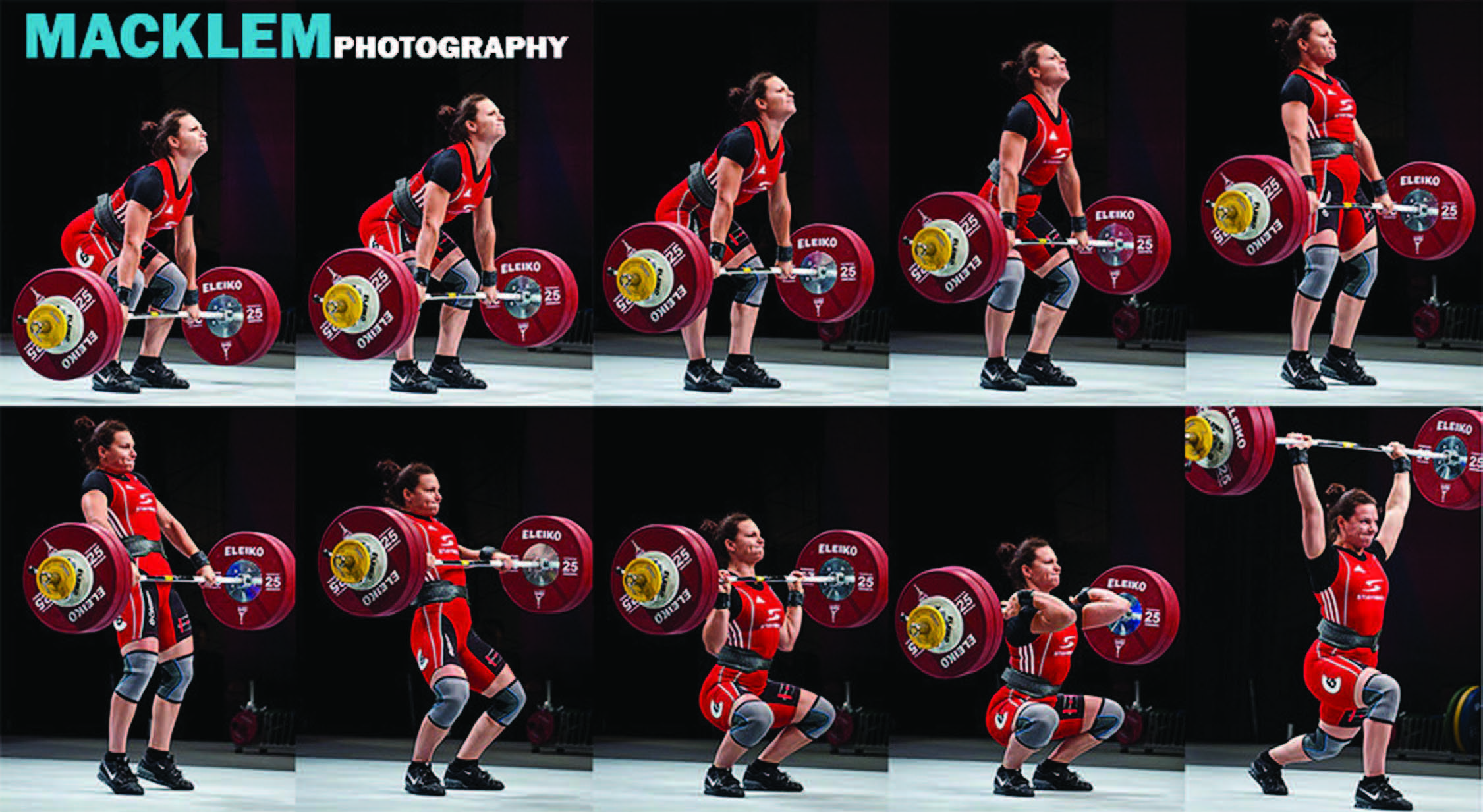
Christine Girard became the first Canadian woman in history to win an Olympic medal in weightlifting when she totaled 236 kilos and walked away with bronze hanging around her neck. Finishing ahead of athletes from traditional weightlifting powerhouses Turkey and Bulgaria, 27-year-old Christine made her lifelong Olympic dream come true in London. A weightlifter from North America winning an Olympic medal is, unfortunately, an extremely rare occurrence. I think I can speak for a lot of people when I say it was a big morale boost to watch this little lady go head-to-head with the titans from across the Atlantic and come home successful.
She was generous enough to agree when I asked her for an interview a few weeks ago. I knew our Performance Menu readers would love to hear about her path to the top, and she didn’t disappoint me with her answers to my questions. So, here is an interview with 2012 Olympic Bronze Medalist Christine Girard from Canada.

Tell us about your background. Where are you from, where do you currently live, what’s your occupation (if you work in addition to training), family life, what kind of sports background do you have outside of lifting, etc.
I was born in Elliot Lake, Ontario. When I was young and living there, my older sister met a weightlifter that was on the junior national team and for some reason, she became her hero. Caroline, my sister, wanted to start weightlifting, but the coaches in Elliot Lake thought she was still too young to start, so she had to wait.
My dad was working in a mine, and then the mine shut down. It was a bit on hard my family, but my parents never showed any sign of it. We quickly moved to Rouyn-Noranda (Québec), close to my extended family and close to my parents’ home town (Ville-Marie) and my dad went back to school. My parents wanted us to start a sport so we could make new friends and integrate into our new town better. Caroline really wanted to start weightlifting, and even if my dad tried to make her change her mind, it never worked! My parents knew that weightlifting wasn’t the best sport for a 12-year-old girl to make new friends. Anyways, that is how weightlifting entered into our family life. My sister started and I followed (I was only 10). A bit later, I also played some volleyball, and I was able to make some friends, but after 3 years of doing both sports, I kind of had to choose because my schedule was too tight…so I continued in weightlifting.
I did all my schooling in Rouyn-Noranda, and I was doing my degree to be a high school math teacher when I competed in the 2008 Olympics. I finished that degree in May 2009, and in the following months, I moved in White Rock, BC to follow my boyfriend, a weightlifter that I met on the national junior team in Korea in 2005. He is a RCMP officer (police/mountie) and got a job in the West. For him it was a good thing: he was going back home after a few years of living in Québec. For me, the move was a bit harder: I had to leave my family, my friends, and my supporters to live in another province, with another language and much less support for athletes. But it was worth it because we got married in 2011 and we are really happy together, with our little dog Chibi to complete our small family!
From 2010 to the Olympics, I decided not to work as a teacher. That job is really hard and time-demanding and I really wanted to get on a podium in London, so I put all my energy into training. I also became a coach for a few high level athletes in BC, on top of coaching myself. I had five different coaches in the past four years in my life….I tried, but in the end, the best for me was to make my own training program: that is how I was able to better control my injuries and also make more progress. My husband became my number one supporter: he was my training coach, my home physio, massage therapist…my everything! I also got the help of Jeane Lassen (2008 Olympian) in the last few months before London, and she made a big difference in my preparation. She is a weightlifter too, and we were training together until she injured her back in April. She could have stopped working with me at that time, but she did the opposite and started to help me even more! I was lucky to have both of them on my coaching team. Also, as I needed someone with international coaching experience for London, Guy Marineau became my competition coach in December 2011 and he was with me in London.

Describe your weightlifting history. When/how did you start? Who have your coaches been? What championships and international teams do you have on your record? What are your best lifts?
My best training lifts are 108 snatch and 135 C&J. My best lift as a 69 (I weighed just under 67) was 107 and 136, and I did them one month before the Olympics. My best 63 lifts are 106 and 133, but my best total is 238kg.
My first competition I did was a local one when I was 10. At that time, my body weight was 38kg I think, and I did a 22.5kg total. I succeeded with 7.5kg on my first attempt and 10kg on my second attempt; they made me do 10kg again on my third attempt so I wasn’t lifting too heavy for my age and size! I did 7kg-10kg-12.5kg for my three C&Js…as you can see, I’ve improved quite a bit in the past 17 years! Crazy what practicing and training can do!
Through all the years, I had a lot of different coaches. So many that I kind of stopped counting. The good thing is I always learned things with every one of them. Sometimes through really good examples, sometime through really bad examples! Both times, I learned quite a bit! In the past few years, I’ve been in control of my programming and preparation, and that was the best for me. I was able to do that because of everything I learned in the past years though, and I don’t suggest other athletes do that. Training and competing is hard enough, when you have the chance to have a good coach making decisions for you, it is really worth following! As for a list of all the competition I did, please look on my website: www.christinegirard.ca/EN/RESULTATS.

Describe the London experience. What was the Olympics like, what do you remember most about the competition, etc.? How did it feel when you knew you had that medal nailed down?
London was a really challenging experience for me. I was feeling ready for it in the few weeks before, my weight loss was going well, and one week before my competition, I injured my shoulder in training! I had pain doing most of the normal lifts: I couldn’t clean, couldn’t jerk, couldn’t snatch. Even doing pulls was putting stress on my shoulder and I had to cut it out of my training for a while. Mentally, it was really challenging. I spent most of my time at the medical center at the Olympic village and had a lot of therapy on my shoulder to make it good enough so I could keep my lift over my head the day of my competition. I injured my stabilization muscles, and the day of my competition, it was really hard to stabilize the weight overhead….I had never before been so shaky at the end of my lift! On my last snatch at 105, I missed it and I hurt my shoulder just a bit more. I knew I was ranked 4th after the snatches, and I knew I would need a really good clean and jerk for me to catch up. The only thing I was able to think about was my technique, as I knew I needed my technique to be as perfect as possible so I could actually hold my lifts stable…and I was just hoping with all my heart that my shoulder would hold it long enough. I didn’t care about the pain; I knew it would eventually go away….but I really wanted to give my everything.
So I did the best with what I had that day: an injured shoulder. When I missed my last jerk at 135, I thought I was finishing 4th again, like in Bejing. I was so sad for a few seconds, but at the same time, I really felt like I gave my everything and I had nothing left in me: everything went there, on the platform. I sent my kisses to my family, and went back to meet my coaches…I looked at my husband, and he was smiling at me. I was so confused! Why is he smiling? I missed it! Then, always with his big smile, he showed me three fingers, telling me I did it, I finish 3rd. I couldn’t believe it a first. Then I looked at my other coach, and he said the same thing! After that, I can’t really remember what I did or said other that “We did it”! I was so happy! We, Walter, Jeane, my family, my friends, my supporters, everyone who believed in me…it was a success for all of us!
Being on the podium and seeing the Canadian flag rising for me, for all my team, was the best feeling ever in my life! I was so proud! 17 years of training, of injuries, of changing coaches, of obstacles, of training in my garage was so worth it for that special moment!

Please give a basic description of your training. Just tell us as much as you can about your program, weekly/yearly planning, etc.
For the past few years, I trained 8 times a week almost every week. I did 2 double trainings 3 times a week so I can give myself 2 days off per week. One of those days off was reserved for my massage and my physio when I needed it. The other days off were a real day off the gym. I was usually having a walk or a bike ride with my dog for some active recovery.
Also, I was spending quite a bit of time for my recovery: stretching, hot tub, ice bath were in my schedule every week! I also had some visualization included in my schedule, so I could control every sphere of training. Obviously, my nutrition was also well looked after…once again I did that part mostly by myself after reading a few books and chatting with a few nutritionists.
As for the actual training program, I had a lot of variation in it: a lot of different exercises and I changed it every single week. I never did the same week twice in the past few years.
Tell us about the support situation for Canadian weightlifters. Do you receive any financial assistance from your sports federation, government, or sponsors?
In Canada, our best weightlifters receive money from Canada government as a salary to be an athlete. They give us $18,000 a year, which is really not that much, but it still helps. The Québec provincial government adds money on top of that for their athletes, and also offer services for free such as massage, physio, nutritionists and sports psychologist. So when I left Quebec to live in the West, I lost almost half of my “salary!”
That being said, I was lucky enough to be on a special program called “Own The Podium.” It is a special program that offers some funding to athletes and teams that have a chance to have a medal at the Olympics so they can afford to go on training camps, have services like massage and things like that. Own The Podium never actually gave me money, but paid for my travel, training camps, recovery etc. This program allowed me to have what I needed for my training in the past few years.
What are your plans and goals for your weightlifting career? How do you see your future in the sport? Do you plan to stay involved in weightlifting after your top competitive years are over?
It is still too early for me to say what I will be doing in weightlifting for now. What I can say is that I’ve been training for 17 years without ever taking a break, and I really think my body deserves a few months of a bit less weight training! We will see how it goes, and see what I’ll decide with time.
One thing I know for sure is that I will always want to stay involved in weightlifting. I learned too much in my 17 years of training to not share that knowledge with other people! So I hope to be able to start a club and get involved in coaching a bit more…in the next few years.
Who are some of your major influences, people you look up to, etc.? Who are the people you want to thank for your success?
My parents. They always supported me, and my sisters. They saw how much we loved the sport, and they loved it just as much as us! Every competition I did when I was younger was a family activity. Every time I needed something, my parents were there for me. They showed me everything I needed to know; they showed me how to always keep going and never giving up. They showed me to be patient and to believe in myself no matter what people could think or say. When I moved in BC, my parents came here to transform my garage into a gym so I can train more and better! They also built me some jerk racks in Québec and had them shipped to me here so I could work better on my jerks (and it worked! My best jerk is 145kg). I owe them my life, in every sense of it.
My sisters: they also always supported me. One of my sisters even started weightlifting so I wouldn’t have to train on my own too often! They were there, every step of the way, helping me, loving me, cheering on me.
Walter, my husband, my best friend, my everything! In the past few years, Walter was for me like a light pole in the storm! He was always there for me, taking care of me, helping me taking every hard decision in my life. He believed in me more than I did sometimes. He even took 3 months off work without pay to be able to help me get ready for London. Without him, I would have never have walked up the Olympic podium.
Jeane Lassen: She understood so well every step of my way! She was always there to help me with my program, but also to help me understand my feelings, and helping me go through tough times. She is an amazing athlete, but first of all an amazing person and I’m so glad to count her on my team!
My few sponsors from my home town: In the past five years of my career, I was lucky enough to have businesses believing in me enough to invest money in my dream! It is really hard for a company to invest in individual sport, as they invest in only one name (they prefer to invest in a team where they can touch more people). But Stavibel, Marcel Baril and CIA Informatique did it with me, and I will never thank them enough for it. They gave more than financial help; they gave me hope and support!
Thank you, Christine. And on behalf of all weightlifters on this side of the globe, congratulations on your achievements. You’ve made us all very proud.

|
Matt Foreman is the football and track & field coach at Mountain View High School in Phoenix, AZ. A competitive weightliter for twenty years, Foreman is a four-time National Championship bronze medalist, two-time American Open silver medalist, three-time American Open bronze medalist, two-time National Collegiate Champion, 2004 US Olympic Trials competitor, 2000 World University Championship Team USA competitor, and Arizona and Washington state record-holder. He was also First Team All-Region high school football player, lettered in high school wrestling and track, a high school national powerlifting champion, and a Scottish Highland Games competitor. Foreman has coached multiple regional, state, and national champions in track & field, powerlifting, and weightlifting, and was an assistant coach on 5A Arizona state runner-up football and track teams. He is the author of Bones of Iron: Collected Articles on the Life of the Strength Athlete. |
Search Articles
Article Categories
Sort by Author
Sort by Issue & Date
Article Categories
Sort by Author
Sort by Issue & Date

